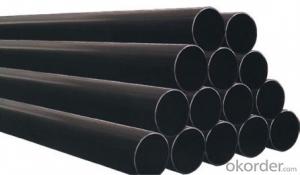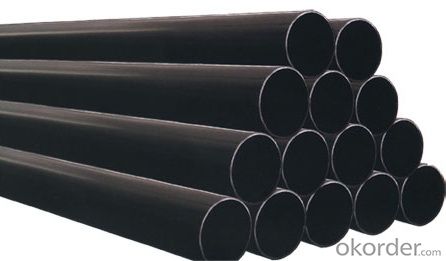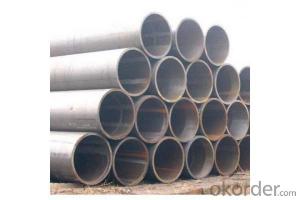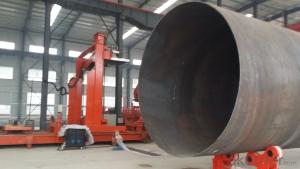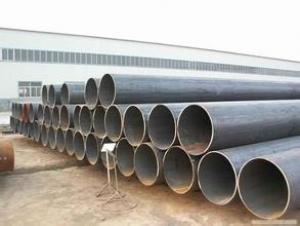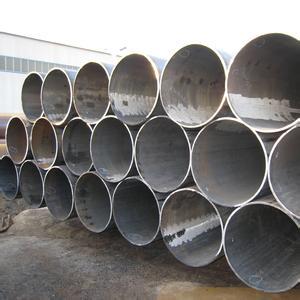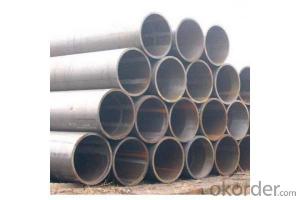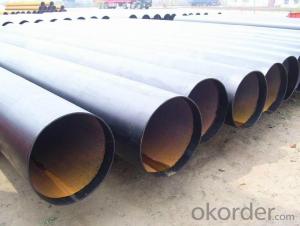18'' CARBON STEEL LSAW WELDED PIPE API/ASTM/JIS/DIN
- Loading Port:
- Tianjin
- Payment Terms:
- TT OR LC
- Min Order Qty:
- 5 m.t
- Supply Capability:
- 300 m.t/month
OKorder Service Pledge
OKorder Financial Service
You Might Also Like
Packaging & Delivery
Packaging Detail: | standard export packing or as customer's requirement |
Delivery Detail: | within 10 - 30 days |
Specifications
Spiral Welded Steel Pipes and Tubes
1.Material:Q195-Q235
2.Length:1-12m
3.WT:1.0-14mm
4.O.D.:20-273mm
Product Description:
1.Material : Q235,Q345,L245,L290,L360,L415,L450,L485,GrB,X42,46,X52,X56,X60,X65,X70,X80,X100
2,Standard: SY/T5037-2000,GB/T9711-2011,API Spec 5L PSL1/PSL2,ASTM A252\A53,ISO3183,DIN17172,EN10217,JIS G3457,AWWA C200,ASTM A139,ASTM A671,ASTM A672
3.Wall thickness: 3.0mm-30mm
4.Outer diameter: φ168mm-3020mm
5,Length: 5m-12m or as your requirement
6,Corrosion protection standard: DIN30670,DIN30671, AWWAC210, AWWA C203, SY/T0413-2002,SY/T0414-2002
7,Application: Oil, gas, natural gas, water pipe, thermal electricity pipe, steel structure engineering, etc
Q195-q345 Material Steel Pipe's Materials
Elements | Chemical Compsition% | Mechanical Property | ||||||
C% | Mn% | S% | P% | Si% | Yield Point (Mpa) | Tensile Strength(Mpa) | Elongation | |
Q195 | 0.06-0.12 | 0.25-0.50 | <0.050< span=""> | <0.045< span=""> | <0.030< span=""> | >195 | 315-430 | 32-33 |
Q215 | 0.09-0.15 | 0.25-0.55 | <0.05< span=""> | <0.045< span=""> | <0.030< span=""> | >215 | 335-450 | 26-31 |
Q235 | 0.12-0.20 | 0.30-0.70 | <0.045< span=""> | <0.045< span=""> | <0.030< span=""> | >235 | 375-500 | 24-26 |
Q345 | <0.20< span=""> | 1.0-1.6 | <0.040< span=""> | <0.040< span=""> | <0.55< span=""> | >345 | 470-630 | 21-22 |
Packaging & Delivery
Packaging Detail: | Normal exporting packing,in container or bulk vessel or as per clients' request |
Delivery Detail: | 2 months after confimed contract |
Specifications
Large Diameter API 5L X70 PSL2 LSAW Steel Pipe
Grade: X42, X46, X50, X52, X60, B, C
OD: 1.5"-28"
WT: SCH10-SCH160
Brand:TPCO
Large Diameter API 5L X70 PSL2 LSAW Steel Pipe
Specifications:
u Standard: API 5L
u Grade: B, C, X42, X46, X50, X52, X56, X60, X65, X70, X80
u OD: 1.5"-28"
u WT: SCH10-SCH160
u Length: 5-12m
u Ends Finish: plain end, bevel end, grooved end
u Surface Treatment: bare, black varnished, oiled finish, red color, anti-corrosion, 3PE, FBE or epoxy coating
u Technique: hot rolled or cold drawn
u Application: api 5l steel pipe for conveying oil, water, gas
u Invoicing: based on theoretical weight or actual weight
u Payment Terms: L/C at sight, T/T or Western Union
u Trade Terms: FOB, CFR, CIF
u Certification: ABS manufacturing assessment, ABS design assessment, API 5CT, API 5L, DNV manufacturer certificate, ISO9001 quality management system certificate, ISO14001 environment management system certificate, GB/T28001 occupational health and safety management system certificate, A1 class manufacturing license of special equipment certificate, CCS, GL, LR, SGS, TüV, PDE
- Q: Can steel pipes be used for plumbing?
- Yes, steel pipes can be used for plumbing. They are commonly used in commercial and industrial applications due to their durability and strength. However, they are less common in residential plumbing due to their higher cost and the availability of alternative materials such as copper and PVC.
- Q: What are the specific differences between flexible pipes and rigid pipes?
- Choose from the waterproof performance:A rigid waterproof sleeve is a steel pipe with an outer wing (a steel ring made of a steel ring), mounted in the wall (mostly concrete walls), used for general pipe wall crossing, and is beneficial to the waterproof of the wall;The flexible waterproof casing except external wing ring, flange ring and internal wire like, and have complete sets sold, but also their own processing, for pipeline damping needs, such as pipes and pumps connected through walls.
- Q: How are steel pipes used in the construction of natural gas power plants?
- Steel pipes are used in the construction of natural gas power plants for various purposes, including transporting and distributing the natural gas. These pipes are used to connect the gas supply to different components of the power plant, such as turbines, boilers, and generators, ensuring a reliable and efficient flow of gas throughout the facility. Additionally, steel pipes are also used in the construction of the power plant's infrastructure, such as the cooling systems, exhaust systems, and other equipment that require durable and corrosion-resistant materials.
- Q: What are the factors that affect the lifespan of steel pipes in different environments?
- The factors that affect the lifespan of steel pipes in different environments include the presence of corrosive substances, such as chemicals or saltwater, which can corrode the steel and lead to degradation over time. Other factors include temperature fluctuations, which can cause expansion and contraction of the steel, leading to stress and potential cracking. The quality of the protective coating on the pipes also plays a role, as a strong and durable coating can provide better resistance against corrosion and prolong the lifespan of the pipes. Additionally, the maintenance and regular inspection of the pipes, including cleaning and repairs, can help identify and address any issues early on, preventing further damage and extending their lifespan.
- Q: How are steel pipes used in the manufacturing of pressure vessels?
- Steel pipes are commonly used in the manufacturing of pressure vessels as they provide the necessary strength and durability to withstand high internal pressure. These pipes are welded or seamless and are often used as the main structural component of the vessel. They allow for the efficient flow of fluids or gases within the vessel and provide a reliable and secure containment system for various industrial applications.
- Q: How are steel pipes tested for leakage?
- Steel pipes are typically tested for leakage using various methods such as hydrostatic testing, ultrasonic testing, or dye penetrant testing. Hydrostatic testing involves pressurizing the pipe with water or another suitable liquid to a predetermined level and checking for any pressure drop over a specific period of time, indicating potential leakage. Ultrasonic testing utilizes high-frequency sound waves to detect any defects or cracks in the pipe wall that may cause leakage. Dye penetrant testing involves applying a colored liquid to the surface of the pipe, which seeps into any cracks or openings, making them easily visible under specific lighting, thus identifying potential leaks.
- Q: What does "DN25 PN16" mean?
- DN is nominal diameter, nominal diameter (or nominal diameter), that is, all kinds of pipe and pipe accessories of universal caliber. The same nominal diameter of the tube and pipe accessories can connect with each other, with interchangeability. It is not a real sense of the pipe diameter or diameter, although its value is closer with the pipe diameter or equivalent; in order to make the tube, pipe connection size uniform, with nominal diameter (also called nominal diameter, nominal diameter).
- Q: What is the maximum allowable stress for steel pipes?
- The maximum allowable stress for steel pipes depends on various factors such as the grade of steel, diameter, wall thickness, and the intended application. It is typically determined by industry standards and codes, such as the American Society of Mechanical Engineers (ASME) Boiler and Pressure Vessel Code. Therefore, there is no one-size-fits-all answer to this question.
- Q: Can steel pipes be used for signposts or street lighting poles?
- Yes, steel pipes can be used for signposts or street lighting poles. Steel is a strong and durable material that can withstand outdoor conditions and support the weight of signs or lighting fixtures. It is commonly used in construction for such purposes due to its strength and longevity.
- Q: What are the advantages of using steel pipes?
- There are several advantages of using steel pipes. Firstly, steel pipes are extremely durable and have a long lifespan, making them a cost-effective choice for various applications. Secondly, steel pipes have high resistance to corrosion, making them suitable for use in harsh environments and underground applications. Thirdly, steel pipes have high strength and can withstand heavy loads, making them ideal for transporting fluids and gases under high pressure. Additionally, steel pipes are versatile and can be easily welded, threaded, or bent to fit specific requirements. Lastly, steel pipes are recyclable, making them an environmentally friendly choice.
Send your message to us
18'' CARBON STEEL LSAW WELDED PIPE API/ASTM/JIS/DIN
- Loading Port:
- Tianjin
- Payment Terms:
- TT OR LC
- Min Order Qty:
- 5 m.t
- Supply Capability:
- 300 m.t/month
OKorder Service Pledge
OKorder Financial Service
Similar products
Hot products
Hot Searches
Related keywords
